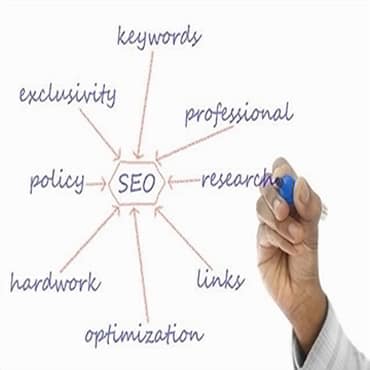4 Important Cornerstones For Starting An Online Business

Estimated reading time: 11 Min
Before you start an online business you’ll need to consider 4 areas: what you want to achieve, technical stuff, creating website content and finding customers.
Build The 4 Cornerstones
These are the 4 cornerstones for any online business.
It’s easier to succeed if you build a solid foundation first – and It’ll help you set off in the optimum direction.
The idea of “setting the jib” in the image mixes the metaphors a bit; but setting the sails on a yacht dictates your direction and your speed of progress.
There are ways to start a business online without building a website. However, I haven’t found any alternatives that last without a great deal of regular effort.
Although it might create a reasonable side income, this is tantamount to being employed, or at best self-employed. Just like for an offline business, a longer-term view is needed to build a real sustainable business.
There is nothing wrong with being self-employed of course, so long as it reflects what you want to achieve.
Now, I’m not suggesting that starting a business (as opposed to becoming self-employed) is easy. It needs a great deal of time and persistence to do what it takes to get going and create sustainability. Blood, sweat and tears come to mind!
But to me, for an occupation to be a business, it will continue to pay me over time, ideally, more, for less of my time. It becomes an investment that provides a long-term income in return for all my upfront effort and eventually allows me to spend less of my time on it so that I can do other things of my choice.
If you have the mindset to start a business online, then don’t skip the basics. Set your sails and course with care.
A Little Bit Of Business Sense
Moving on, and stating the obvious perhaps, all businesses sell something (products and/or services) and need to attract prospects (potential customers).
There was a time online when the “build it and they’ll come” principle worked for more or less anything that got built. Those days are long past. Nowadays, owners of online real estate following this principle get nowhere useful, and before you ask… yes, I’ve been there.
So, why have an online presence at all? For some of the benefits of starting an online business see “12 Personal Reasons To Start An Business Online”.
An important factor though is the sheer number of online searchers, and daily, more and more people are buying online. In 2020 there were more than 10.3 billion online organic searches every month through a combination of search engines.
That’s at least 10,300,000,000 searches for information on the web every single month, with Google handling about 70% of them. That’s more than 240,300,000 searches per day via Google alone, and nearly half as much again through other search engines!
In addition, Google tells us what people are searching for. Therein lies a goldmine of opportunity, if you know where to dig. As with any goldmine, digging takes some effort, but online the data isn’t hidden!
This is why it’s so important, when you build a website, to make it “Google friendly”.
Search engines evolved over the years (since about 1991) through deliberate development to deliver the online search intent of humans.
It’s still not perfect yet. I regularly get some odd results from Google when measured against my search intention.
However, delivery of Search Engine Results Pages (SERPS) has improved enormously over time and Google is releasing tweaks to their algorithms (some small, and some much more significant) every day.
There are of course many ways to advertise a site’s existence other than via search engines.
In addition to free, organic methods, there are many paid methods (such as paying for adverts on search engines). However, if you plan to sell anything to humans, you need to create an experience that is easy for humans to use, in the same way, that Google itself is trying to do.
That sounds obvious perhaps, but what’s my point?
If you don’t already have the necessary skills to build a business online then you will either need to learn how to do it yourself or pay someone else to do it for you.
The thing is that, if you learn about the most important aspects of presenting a website to the world, then you will find it much easier to be able to tell someone else what you want when you want help. Then later, you’ll be in a much better position to know if they’re doing a good job or not.
You need to learn at least a minimum in order to communicate your requirements and to subsequently know what you’re getting. Like builders on terra firma, many are excellent and completely trustworthy and others are not. Buyer beware.
Steps For Starting An Online Business: 4 Cornerstones
There are in effect four major steps to building a sustainable business online:
1. First, you need to know what you want to achieve.
As for any business whether online or not, figuring out what kind of business you want to create is essential.
It sounds obvious. Yet it’s amazing how many people start up a new business, especially online, who have put very little thought into what they really want to achieve!
Now, we all need to start somewhere and doing something is far better than doing nothing about it.
However, at the point where you know you want to take building a business seriously, a few hours of thoughtful, deliberate preparation can be the difference between heading towards success or failing with that venture.
So, start with some research, then you can make decisions and some planning. Ideally, write down your thoughts about…
- What the business area is,
- What it is that makes this particular idea a good opportunity, plus…
- How and where potential customers (or prospects) can be found.
…will help minimise your risks.
These are the minimum requirements that many online business builders miss at the beginning.
It takes time to develop business ideas. Writing things down helps enormously with clarity, confidence and when appropriate, the ability to communicate those ideas.
Writing it down has many advantages, not least being able to review, remind yourself and adapt as appropriate over time. This is the first step… but nothing is set in stone.
However, most importantly, being clear enough early on about what you want to achieve and why helps enormously towards creating a useful and positive mindset.
In addition, a winning business plan is best when embellished with business targets against which future results can be tracked.
2. Secondly, there’s the technical stuff.
Some people love the technical side of building a website… which includes me at times.
Others seem to hate it… I hate the technical side too, at times!
Love it or hate it, the technical aspects of building and maintaining a website are far easier in 2022 than they were when I first attempted to make a site in the late 1990s.
Even if you’re paying someone else for site construction, you need to learn enough to describe what you want, especially on the subject of communicating with potential customers.
This includes a basic knowledge of website design to encourage people to visit your site and to stay there for more than a few seconds.
3. Thirdly, you will need to be able to create content.
Over the years, I’ve seen many adverts for website building that make it sound simple. Well, it is indeed easy to get started, and quick. It’s really easy to build a framework nowadays.
However, most advertisers neglect upfront, to talk about the enormous amount of time and effort needed to create the useful content of a website. This isn’t difficult for a dedicated individual, but it does take an investment of time.
Many also ignore the need to optimise the site to make the most of the search engine processes. Others get bogged down in optimising to the detriment of writing enough useful content.
An experienced friend of mine talks about spending 90% of their time focused on the priority of creating useful and well-presented content, and only 10% on everything else.
Obviously, if you’re building a business, the content of your website reflects your business.
One way or another you’ll need to write, or pay someone else to write, and construct articles and pages to build up useful content on your website, designed to make the most of the world wide web.
This doesn’t mean becoming a great writer like your favourite author.
But it does mean understanding how best to write articles that work well for people looking for information on the internet.
This is perhaps the single most important point here. It is perhaps more important than basic site construction and optimisation of content for search engine algorithms.
Developing good writing habits is essential.
Presenting useful content on a website is about writing, or presenting videos for people based on what they want to read or learn about.
4. Fourth, you need visitors.
There can be no business without footfall, or “traffic”, as visiting people are (perhaps crudely) referred to nowadays, especially when online.
Given the volume of natural traffic available online via search engines such as Google, it makes sense to design and build a website for attracting people who are searching for your services and products, whatever they happen to be.
It takes time to build up a following.
This means first writing useful content that people are searching for, and then doing what you can to encourage search engines to show your site high up in Search Engine Results Pages (SERPs).
Other than via online search engines, there are many additional ways of attracting prospects that can be used over time.
Some are free, apart from your time, and others have a financial cost.
So, Build Great Foundations
To build more than a short-term business online, solid foundations need to be in place first. Solid doesn’t necessarily mean big or complicated. In order to set foundations up well, It’s worth learning how to optimise opportunities for organic search traffic through “Search Engine Optimisation”, or SEO.
Taken in isolation, each of the 4 areas is relatively simple, if not always easy. What seems to complicate it more for many, is the interrelationship between the areas.
The common denominator is the value of the internet search engines. Nowadays, we start with our own research online and want to set up our sites so that they get found and are taken seriously by other people when they search for and find us.
The thing is that if we are to take advantage of the search engines, we need to learn what we can about how they work and build those considerations into everything we do online from start to finish.
More On Search Engine Optimisation

Writing content and Search Engine Optimisation go together but they’re not quite the same thing.
The term, Search Engine Optimisation (SEO) seems to have first been used as early as 1991.
I think that the way the term is used nowadays by most website owners and builders is a bit of a misnomer really!
Originally it referred to optimising the actual search engine algorithms.
For many years now web developers have been using the term SEO to mean the process of optimising website content to make the most of the search engine services.
Perhaps the website side of the SEO coin should be called “Website Optimisation for Search Engines” (WOSE). I wonder if that’ll catch on.
Anyway… the concept of SEO has generated a new profession of people known collectively as SEOs.
The search engines, Google, for example, don’t publish their algorithms (although they do give many clues). In addition, observations of search results by many have led over time to educated guesses about the way the algorithm works… therefore the role of the SEO relies on educated guesswork and hints and tips!
The opportunity for SEOs arises in part because, as search engines improve their ability to understand the meaning of the words used by a searcher, and to figure out a searcher’s intention, they get better at delivering accurate results. Artificial Intelligence (AI) plays a big part nowadays.
The evolution of search engines has led to an evolution of optimising websites to use them.
Thankfully, the more sophisticated search engines have become, the more important it has become to write and present content designed specifically for humans to read, and to deliver useful information that humans are looking for.
The more sophisticated and complex the search engine algorithms become, in theory, optimising our websites is becoming more straightforward.
Objectives Of Search Engine As Businesses
Search engines, like any other business, are set up to make a profit. The well-documented purpose, of the development of search engines, is to deliver a better user experience by delivering “Search Engine Results Pages” (SERPS) that…
- answer their user’s specific queries,
- present answers that are easy to understand,
- on sites that are in part at least, selected for their ease of use.
So the Search Engines try to deliver SERPS that keep their searchers coming back for more. Therefore, websites that get the best rankings should be specifically answering an enquirer’s query better than other sites do I.E.:
- more comprehensively,
- clearly,
- and on a site that is easy to navigate and read.
Over time, the search engines have got better at delivering SERPs that show the sites that are most likely to answer a searcher’s queries well, and will undoubtedly continue to improve such that human writers and sites will be competing with other human writers even more than today, as opposed to writing for the search engines, as has been happening in the past.
Summary
Here are the main points again.
So to start a business online, I recommend you first learn how to build a website that:
- delivers the users intent from a search engine query;
- has more information than any competition;
- is easy to explore and read…
… then your site will get the best chance to flourish in a competitive web.
Site builders who embrace the quirks of the search engines have more chance of developing successful, easily found and useful sites than those who take search engines less seriously. But unless you actually want to work as a full-time SEO professional there’s no need to learn everything.
Learning as much as you can about the technical side of website building, whether you use it yourself or pay someone else, is a useful skill set to develop.
Above all, figure out what you want to achieve first. Create at least a minimal business plan. You’ll find it’s worth its weight many times over, Above all, learn what you need to start a successful online business.
If you enjoyed this post, please leave a comment and share.
If you’d like to receive updates, please add your email to the form below. Thank you!
Richard B


![Are Wealthy Affiliate Hubs Revolutionising Website & Content Development In [year]? A futuristic and sleek digital workspace designed for website management and content creation - Wealthy Affiliate Hubs](https://ml0yvzumdtic.i.optimole.com/cb:k6B_.1fa14/w:740/h:370/q:mauto/https://solobusinessmind.com/wp-content/uploads/2024/12/A-futuristic-and-sleek-digital-workspace-designed-for-website-management-and-content-creation-Wealthy-Affiliate-Hubs740x370-O.jpg)



